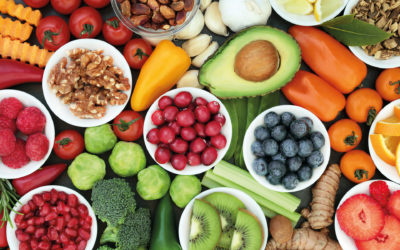Vitamins and the elderly
In the early stages of life, we change and grow constantly. Our nutrient requirements varying dependent upon our point of growth from child to young adult. Then, as adults we are faced with the impact of daily life and the responsibility of making the right diet and lifestyle choices to keep us fit and healthy.
In later life our requirements begin to alter yet again, we begin to face a variety of challenges and limitations which may pose a risk to our health and nutrition.
In older age it is quite common for our appetite to change. No longer wanting large meals and dealing better with smaller more frequent snacks through-out the day.
Illness, frailty or a reduction in mobility could mean that once simple tasks such as shopping or preparing and cooking a meal might become more difficult. People living alone may also feel unmotivated to cook for one. These circumstances can all lead to relying on processed foods that are less time consuming to prepare. When appetites become smaller the quick and easy option of a few biscuits or crackers throughout the day and maybe a sandwich in the evening can creep in.
These factors can easily lead to a low nutrient diet that slowly but surely affects our overall health and ability to fight infection.
It is important to remember that pre-made processed foods have little nutritional value and are often high in trans fats, sugar and salt.
The challenge is to eat more nutrient-rich foods, such as fruits, vegetables, whole grains, nuts, healthy fats, beans, fish, natural yoghurt, other good quality dairy products and lean cuts of meat.
Prolonged consumption of a nutrient poor diet may lead some people to become mal nourished. Resulting in a higher risk of health problems, feelings of fatigue, depression, confusion and anxiety. Also, longer recovery times from illness.
So, how best to keep yourself nourished and ready for anything through your 60’s and beyond?
Here is a brief outline of some vitamins which are particularly important as we age and where best to find them:
Protein
Being one of the more commonly known nutrients due to its regular consumption and high amounts contained in meat and eggs.
When you think protein, think repair and regeneration of cells. Skin, hair, nails and hormones are mostly made of protein. Protein is also an important building block of bones, muscles, cartilage and blood.
With the right amount of protein in your diet the body will have what it needs to regenerate and repair tissue.
To become deficient in protein is rare. The recommended amount to consume over the course of a day is 0.8 grams x every kilo of ideal body weight. It is advisable to include a protein source in with every meal and snack to balance blood sugar and provide the body with adequate amounts through out the day.
Meat is not the only option! Plenty of plant-based sources contain ample amounts and are sometimes easier on digestion whilst providing a variety of other vitamins and minerals:
| Nut/Seed (4 tbs) | Protein (g) |
|---|---|
| Chia Seed | 12 |
| Hemp Seed | 10 |
| Flax seed | 8 |
| Sunflower seed | 8 |
| Pumpkin seed | 7 |
| Almond | 7 |
| Pistachio | 6 |
| Walnut | 5 |
| Cashew | 4 |
| Beans (1 Cup cooked) | Protein (g) |
|---|---|
| Lentil | 18 |
| Adzuki | 17 |
| Cannellini | 17 |
| Navy bean | 16 |
| Black bean | 15 |
| Kidney bean | 15 |
| Grains (1 Cup cooked) | Protein (g) |
|---|---|
| Whole Wheat Couscous | 6 |
| Bulgar Wheat | 6 |
| Buckwheat | 6 |
| Quinoa | 6 |
| Brown Rice | 5 |
| Vegetables (cooked) | Protein (g) |
|---|---|
| Corn (1 large cob) | 5 |
| Potato (with skin) | 5 |
| Mushroom, Oyster (1 cup) | 5 |
| Collard Greens (1 cup) | 5 |
| Peas (1/2 cup) | 5 |
| Artichoke (medium) | 4 |
| Broccoli (1 cup) | 4 |
| Brussel Sprouts (1 cup) | 4 |
Fats
Fat was a big topic in the 80’s and received a lot of bad press. The fat free revolution was a catalyst for people completely cutting it out of their diet in an attempt at a slimmer physic. Decades on we now know that fat is extremely important for our brain health. Also allowing us to absorb fat soluble vitamins such as: A, D, E and K.
The beneficial fats are those found in:
Oily Fish: Sardines, Mackerel, Salmon Herring, anchovies, Avocado, nuts, Seeds and Olive oil.
Bringing these into the diet on a regular basis is a great way of providing your body with the benefits of these mono saturated fats and polyunsaturated fats.
It is advisable cut back on the saturated fats:
- Fatty cuts of meat
- meat products, including sausages and pies
- butter, ghee and lard
- cheese, especially hard cheese like cheddar
- cream, soured cream and ice cream
- Some savoury snacks, like cheese crackers and some popcorns
- Chocolate confectionery
- Biscuits, cakes and pastries
Vitamin C
Is a powerful antioxidant. It also helps with maintaining skin integrity, supports our immune system – protecting against viruses. Supports our liver function and so much more.
You will find the highest content of vitamin C in: citrus fruits, broccoli, Brussels sprouts, bell peppers (Red orange and yellow!), raspberries, strawberries, blueberries, acerola cherry and the humble potato.
B12
All B vitamins have an extremely important role to play in our health.
Focusing for now on B12, a nutrient found in meat, fish, eggs and milk.
Elderly people are particularly at risk of vitamin B12 deficiency because of malabsorption, and the increasing prevalence of pernicious anaemia with advancing age.
Essential for the normal metabolism and functioning of all cells in the body. Vitamin B12 deficiency can pose significant adverse effects to organ systems with a high cell turn-over such as bone marrow, gastro-intestinal tract, and brain.
If you are unsure or feel it is something you need to explore further, then contact your GP for advice.
Vitamin D
Vitamin D deficiency is extremely prevalent among the elderly and is associated with a higher risk of fracture. A combination of adequate vitamin D, K2, Calcium and magnesium are required for optimum bone health.
Vitamin D is the precursor of a hormone that has a number of important functions. Synthesized in the skin (after UV light exposure), not only has vitamin D been proven to support bone health, it’s far reaching effects aid immune function and gut health.
Knowing your vitamin D levels via a test is a way of knowing your personal requirements.
Supplementing under the advice of a trained professional can ensure your levels are optimum through out the year. As we know only too well, sunshine in the UK is limited. Through October to March it is advisable to supplement with a good quality brand.
Although sun exposure is the best and most effective way of obtaining vitamin D. There are a few dietary sources such as: fortified milk and cereal, fish, liver and egg yolks.
Older and elderly adults who are struggling to maintain a healthy and balanced diet may find they could benefit from the guidance and support of a nutritionist. A qualified nutritionist will be fully aware of the challenges older and elderly adults face and will work with their patient to formulate a nutrition programme to suit the patient’s individual needs. This may include food and meal recommendations as well as ideas for gentle activities for elderly patients to improve their mobility.




